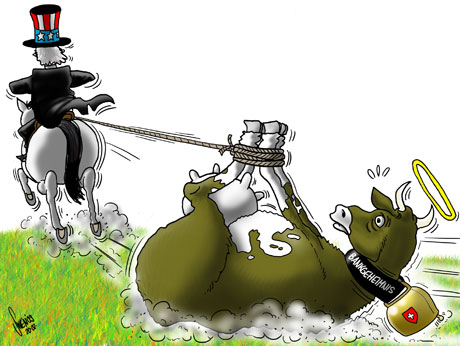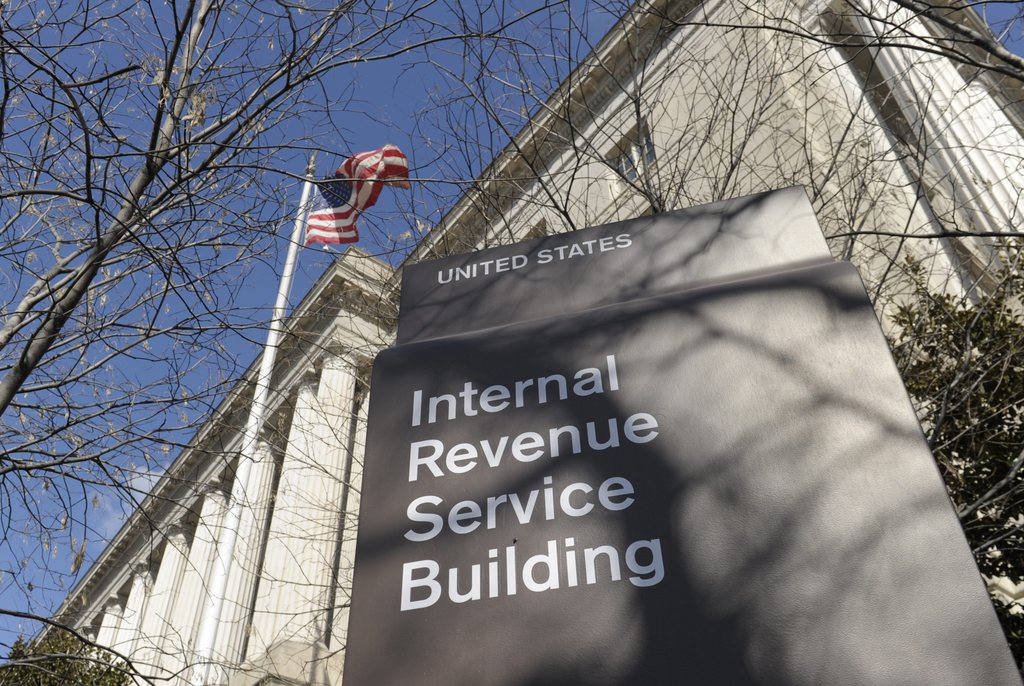Swiss take first step to end US tax spat

A draft law allowing Swiss banks to pass data to the United States justice authorities has won approval by the Senate. The other parliamentary chamber, the House of Representatives, is set to discuss the controversial issue next week.
Following more than 20 hours of debate, the Senate on Wednesday approved the divisive bill by 24 votes to 15.
Supporters, mainly from the centrist parties, warned of the potentially disastrous consequences for indicted banks, the finance industry and also for the Swiss economy if the government-sponsored bill was rejected.
The law would help draw a line under a dark chapter of banking history, said Senator Pirmin Bischof, while This Jenny expressed concerns about possible job losses in the banking industry.
Other supporters of the draft law stressed that a proposed deal between the banks and the US would not put a financial burden on Swiss taxpayers.
“Given the choice between an emergency landing and a crash, I prefer the former,” said Werner Luginbühl.
Opponents, mainly from the centre-right Radical Party, criticised the cabinet as it refused to provide additional information on the proposed deal, notably the amount of fines the banks could face. The cabinet was also accused of failing to take responsibility by deferring the decision to parliament.
Many speakers warned that acceptance of the bill would encourage other countries in Europe to follow the US example and exert additional pressure on Switzerland.
Despite all the differences, both sides agreed that the US programme – offered to Swiss banks suspected of helping wealthy American clients stash away money from the tax authorities – amounted to blackmail.
Werner Luginbühl
Given the choice between an emergency landing and a crash, I prefer the former.
Responsibilities
Finance Minister Eveline Widmer-Schlumpf reiterated the importance of a correct legal framework for the banks to settle investigations into tax evasion.
She called on senators to give banks the opportunity to take the responsibility for their mistakes and avoid further damaging the reputation of the Swiss financial centre. Otherwise the problems risked becoming a never-ending story, she added.
During the debate the Senate decided to amend the draft law, boosting the right of accountants and tax lawyers to challenge decisions to hand over certain data. The financial regulator is to be mandated to draw up a detailed report about the management of assets by foreign clients.

More
Banking secrecy
Tax evasion
As part of the deal, Swiss banks can disclose their US dealings, including names of bank staff and third parties such as accountants and tax lawyers who helped Americans evade taxes.
This would pave the way for individual banks to reach their own agreements with the US authorities without breaking Swiss law and violating banking secrecy rules. It is said that the settlements could include fines worth several billion dollars for Swiss banks.
At least 14 Swiss financial institutions have been under investigation, suspected of helping US citizens evade taxes. Two financial institutes have closed down over the past six months.
Switzerland’s oldest private bank, Wegelin, was forced to shut its doors following a US indictment in January. It admitted to wrongdoing and paid $58 million (CHF54 million) in fines.
In 2009, the country’s biggest bank UBS was forced to pay a fine of $780 million and deliver the names of more than 4,500 clients to avoid indictment, handing information that allowed the US authorities to then pursue other Swiss banks.
Next hurdle
Following the Senate approval on Wednesday, the bill now goes to the House of Representatives, where opposition to the deal is likely to be tougher.
The law, to be in place for 12 months only, will have to win a qualified majority – more than half of all members of each chamber, not just a majority of those present – to come into force at the beginning of next month.
If parliament fails to meet the deadline, Washington has threatened to withdraw its offer for the Swiss banks to hand over internal information over the next 120 days to avoid an indictment.
In a related business, the Senate is due to begin discussions next week on a tax compliance bill with Washington.
The Foreign Account Tax Compliance Act (FATCA) obliges foreign firms to report offshore accounts belonging to US taxpayers that amount to more than $50,000. Critics say the bill further undermines the cherished Swiss banking secrecy laws.
2009: Switzerland’s biggest bank UBS agrees to turn over more than 4,450 client names and pay a $780 million fine after admitting to criminal wrongdoing in selling tax-evasion services to wealthy Americans.
July 2011: Second biggest bank, Credit Suisse, is under criminal investigation by US. The bank later makes a provision for a potential fine of CHF295 million.
February 2012: US justice department indicts Wegelin, Switzerland’s oldest private bank, on charges that it enabled wealthy Americans to evade taxes on at least $1.2 billion hidden in offshore accounts.
June 2012: US treasury department reaches a tentative agreement with Switzerland to help banks comply with US tax evasion regulations.
June 2012: Bank Julius Baer hands 2,500 employee names to US authorities in a bid to free itself from the tax probe, according to lawyers.
August 2012: Global bank HSBC hands over details of current and former employees to the US authorities.
November 2012: Private bank Pictet confirms it is also under investigation by the US.
December 2012: Two bankers and one former employee of Zürcher Kantonalbank charged by US, accused of helping US clients avoid taxes.
January 2013: Wegelin private bank shuts its doors, following a guilty plea to charges of helping wealthy Americans evade taxes through secret accounts. It agrees to pay nearly $58 million in fines on top of $16.3 million in forfeitures already obtained by the authorities.
May 2013: Swiss government presents bill to parliament that would let Swiss banks hand over internal information to US to avoid threatened criminal charges – though the banks still face fines likely to total billions of dollars.
The bill aims to save the banks from heavier punishment in the United States for helping wealthy tax cheats, by sidestepping its secrecy laws to let bankers disclose data to US prosecutors.
June 2013: Parliament begins discussions on banking deal.

In compliance with the JTI standards
More: SWI swissinfo.ch certified by the Journalism Trust Initiative




You can find an overview of ongoing debates with our journalists here. Please join us!
If you want to start a conversation about a topic raised in this article or want to report factual errors, email us at english@swissinfo.ch.